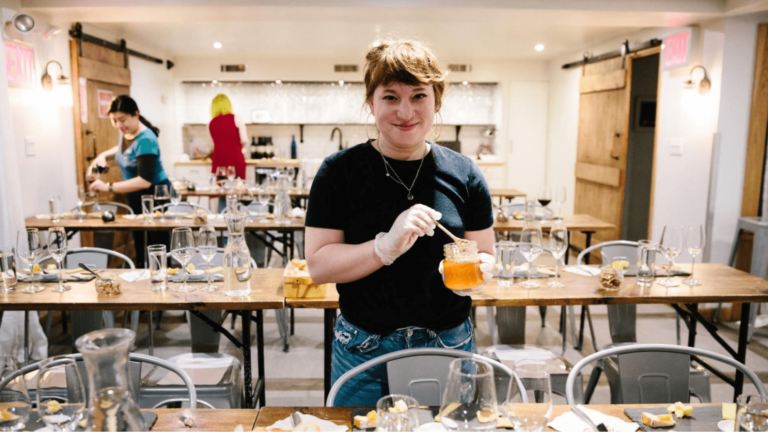Curious about hospitality and its significance in the events landscape?
Hospitality is at the forefront of everything you do as an event creator — it’s all about making your attendees comfortable and happy. After all, happy guests play a pivotal role in the success of your events.
At Eventbrite, we understand the importance of fostering a community that brings together both event creators and hospitality experts. Our platform offers a wide range of tools and features that actively support you as you craft exceptional experiences for clients and attendees, driving repeat attendance.
Translation — we know a lot about hospitality and want to share.
This guide will walk you through what hospitality is, the different types of hospitality in event management, and how to get started in hospitality.

What is hospitality?
The term “hospitality” holds diverse interpretations for different people. However, in its classical Greek essence, hospitality refers to the warm and generous manner in which hosts welcome and entertain their guests.
Hospitality is deeply rooted in some cultures, and for many, it permeates their daily lives. It revolves around creating an atmosphere for guests that instantly makes them feel at home.
Hospitality covers vast areas within event planning, including:
- Communication: ensuring guests receive precise event schedules, clear signage, and personalized correspondence to elevate their experience
- Guest reception: setting up a reception or help area, and strategically positioning team members to welcome guests upon arrival
- Catering and refreshments: offering opportunities for meals, snacks, and drinks to sustain your guests throughout an event
- Entertainment: arranging engaging activities or hiring performers to enhance the event experience
- Vendors: engaging retailers to establish booths at your event or donate products for guest giveaways
- Staffing: ensuring your team is adequately staffed and trained to assist guests and handle various scenarios effectively
- Facilities: ensuring access to essential facilities like restrooms, breakout spaces, or sensory rooms
- Cleaning and maintenance: assigning staff to maintain cleanliness and functionality of the facilities and venue
But no two events are completely alike, so this list is just the tip of the iceberg.
Factors like giveaways, food sampling, or parking provision can also play a role. It’s also important to note that different hospitality professionals specialize in different types of events.
Why hospitality is important
If you want to create an amazing event that people will remember, hospitality needs to be at the forefront of your mind. That’s because hospitality is all about delivering great customer service.
Most of us attend events expecting a certain level of support and services.
By providing guests with exclusive access to an accommodation venue, or establishing a partnership with a local hotel manager to offer favorable rates, you remove friction from the guest experience. This makes everything easier and more enjoyable for your attendees.
A positive guest experience is one factor leading to businesses enjoying an average price premium of 16% — when customers feel appreciated, they’re willing to buy more and pay a higher price for it.
Meanwhile, 32% of customers surveyed told researchers they’d stop doing business with a brand they loved after just one bad experience. That’s why you should keep hospitality at the forefront of your events.
Why would you go into the hospitality sector?
Growth in the hospitality sector outpaced big tech and retail in 2022 — there’s a huge demand for talent in the hotels, catering, and conference sectors.
The Bureau of Labor Statistics is expecting the US economy to add 8.3 million jobs by 2031, and more than one in five of those new jobs will be in the hospitality sector.
That’s one reason why it’s worth going into (or at least putting more emphasis on) hospitality. However, it’s important to keep in mind that hospitality is just one aspect of creating the ideal event plan.
If you want to know more about event planning, take a look at our free event planning template.

What are the different types of hospitality?
Hospitality roles vary dramatically by sector and event type.
To give you an idea of what those specialties are and how they relate to event management, we’ll walk you through a few of the most popular.
Food and beverage
Food and beverage is the biggest hospitality sector because it’s deeply embedded in almost every other hospitality segment, and it’s certainly a significant component of a successful event. After all, most events require some sort of refreshment, right?
People bond over food, which is why it’s an essential aspect of hospitality and guest experience.
Food and beverage vendors encompass a wide range of options, such as full-service restaurants, mobile catering teams, food trucks, and food delivery services. They also include internal and external contractors working with specific venues like hotels or convention centers.
Accommodation
While food and beverage is the most prominent branch of the hospitality ecosystem, accommodation is expected to be the fastest-growing sector over the next five years. And if you’re planning an event and striving to provide attendees with a great experience, you must consider accommodation.
Accommodation includes any kind of housing for your guests, such as boutique hotels, budget motels, quirky Airbnb spots, stately homes for hire, or campsites.
By providing guests with exclusive access to an accommodation venue or establishing a partnership with a local hotel to offer favorable rates, you’ll remove friction from your guest experience that’ll make everything easier and more enjoyable.
Leisure
The leisure component of hospitality is another big umbrella that can also include events.
We’re talking about everything from corporate events and weddings to private parties, fundraising events for charities, sporting events, or festivals. But looking beyond events, it includes static businesses like concert venues, amusement parks, spas, and other leisure facilities.
Simply put — if it provides guests with rest, relaxation, or enjoyment, it falls under the category of the leisure industry. That’s why this branch of hospitality is critical to any event. Guest entertainment, event themes, and leisure facilities all play a key role in your overall customer experience.
Travel and tourism
Travel and tourism are all about getting people from place to place. Tourism drives people to travel, covering everything from buses and trains to airlines, ride-sharing services, tour guides, travel agencies, and cruise ships.
Demand in this space is high. Americans are more keen to travel in 2023, while staffing shortages have led to huge demand for fresh talent.
But as an event creator, you must be critical when incorporating travel into your event planning. You need to work with hospitality experts and travel agents in this area so your guests can get safely to and from your event — and if you need to expand your network of hospitality connections, Eventbrite’s vendor network is a fantastic place to start.
You can also get some ideas from our vibrant community who can inspire you and help you forge partnerships with other hospitality experts.

How do you get into the hospitality industry?
There’s no right or wrong way to get into hospitality. Many professionals simply start by finding work experience within one of the sectors of hospitality, and building a portfolio as they work their way up the ladder.
But to help give you an idea of how to start finding work in the broader hospitality industry, let’s look at a few popular ways to get your foot in the door.
Create your event on Eventbrite
Interested in building an event-based portfolio? Create your event on Eventbrite and access millions of potential attendees.

Get a college degree
You don’t need a degree or a qualification to get into hospitality — but it can help.
By pursuing a college degree, you’ll be able to spend more time developing a firm foundational knowledge in all aspects of hospitality. You’ll find hospitality programs at several leading colleges in the US, like Cornell, NYU, and Boston University. Many schools also offer flexible online hospitality programs for people who are already in the workforce, and there are dozens of online offerings by universities all over the country.
Many hospitality programs will let you specialize in a specific area, and provide opportunities for work experience, internships, and networking.
Get an industry certification
If you’re not into the idea of studying to earn a degree, you could instead kickstart a career in hospitality by taking a short certified course from a recognized industry body or trade organization.
One of the most popular options is the Certified Meeting Professional (CMP) certification from the Events Industry Council (EIC). It’s widely considered the industry standard certification for those working in the events industry.
More niche trade bodies you might want to check out include the American Hotel & Lodging Association, Hospitality Financial and Technology Professionals, and National Restaurant Association.
Networking
Networking events allow you to learn the tricks of the trade, get advice from business mentors, and connect with venues, caterers, event planners, and other vendors.
The more extensive your network, the easier it’ll be to get work experience and match your clients with all the professionals they need for the perfect event.
Looking for places to network with hospitality experts? Search for networking events on the Eventbrite events page and find one in your area. Our event creators plan a range of events all over the country designed to help connect hospitality professionals.

Hospitality FAQs
Questions about the hospitality business? Here are the answers to some key questions we often get asked.
What is the 10 and 5 rule in hospitality?
The “10 and 5 rule” is an industry standard in the hotel and restaurant sectors. It essentially says that if a member of your hospitality is within 10 feet of a guest, they should smile and make direct eye contact. When they’re within five feet, they should verbally greet the guest.
This rule is all about making guests feel comfortable and demonstrating that employees are approachable and there to help.
What are the four Ps of hospitality?
Many hospitality experts will talk to newcomers about the “four Ps” of hospitality. These are:
- Product
- Price
- Place
- Promotion
Your product can be the hotel, food, or event you’re promoting to guests. Your price needs to be competitive, while place is all about driving interest in your venue or location.
Promotion is all about communicating the critical information and unique selling points (USPs) about your event or product to get people in the door.
How can hospitality management tools boost your event?
Nobody will ever find out about your event, products, prices, or location without great promotion. That’s why it’s critical to have a range of event marketing tools at your disposal.
For example, Eventbrite’s marketing platform enables you to manage social media ads, send email reminders to guests, and track user journeys to help you better understand your customers.
You’ll also want to ensure you have access to an intuitive event management platform that simplifies ticket sales, assists in designing seating arrangements, and checks-in attendees as they arrive.
Choosing the right hospitality and event management tools will make your user experience smooth and simple — and that’s what hospitality is all about.
From what is hospitality to creating an event
The hospitality sector is a vast ecosystem that plays home to event creators, chefs, charity workers, bartenders, hoteliers, pilots, and everything in between.
Hospitality professionals are in demand across the board — no matter what strand of hospitality you’re interested in, abundant career opportunities are available.
But if you need help connecting with others in the industry, consider joining the Eventbrite community.
Our range of tools can help you create one-of-a-kind events people will love, while our weird and wonderful community will help inspire you.






